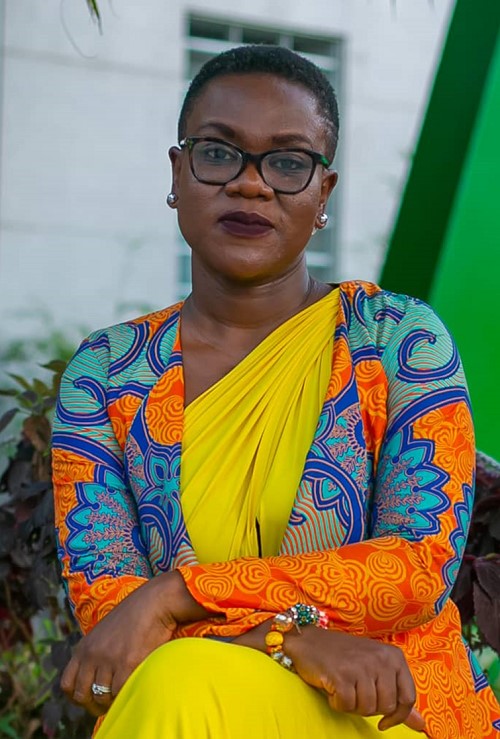When did spelling bees start? Why is it spelling ‘bee’? Why did you decide to run a national spelling bee? Why do all Spellers ask, “May I have the origin of the word?”
These are questions I get whenever I tell tweenagers what I do. Everyone seems intrigued with this ‘phenomenon’ called spelling. Did I always know that I would want to work at The Spelling Bee? Of course, not?! I started out wanting to be a flight attendant – I love travelling and what a fun and inexpensive way to do that – but my dad had told me that it meant me acing my Geography. I dreaded that subject, so I shelved that career idea and latched on being a lawyer. That aspiration fizzled out like a 3-day-old opened can of soft drink; not sure why though.
US Amb to Ghana & Lady Julia presenting nadia Mashoud her trophy as The Spelling Bee 2020 Champ
One thing that remained constant through my primary and secondary stages of education though, was my love for languages. In my primary years, I could speak Twi, Ga, Ewe Mfantse, Hausa and English. I added on (basic) German and French in secondary school. The other constant in my life was my love for reading; it was my best escapism from the harsh realities of life, especially in boarding school.
But I digress…or do I?
- When did spelling bees start? – The word bee,as used in spelling bee, is one of those language puzzles that has never been satisfactorily accounted for. A fairly old and widely-used word, it refers to a community social gathering at which friends and neighbors join together in a single activity (sewing, quilting, barn raising, etc.) usually to help one person or family.
The earliest known example in print is a spinning bee, in 1769. Other early occurrences are husking bee (1816), apple bee (1827), and logging bee (1836). Spelling bee is apparently an American term. It first appeared in print in 1875, but it seems certain that the word was used orally for several years before that.
Those who used the word, including most early students of language, assumed that it was the same word as referred to the insect. They thought that this particular meaning had probably been inspired by the obvious similarity between these human gatherings and the industrious, social nature of a beehive. But in recent years scholars have rejected this explanation, suggesting instead that this bee is a completely different word.
One possibility is that it comes from the Middle English word bene, which means “a prayer” or “a favor” (and is related to the more familiar word boon). In England, a dialect form of this word, been or bean, referred to “voluntary help given by neighbors toward the accomplishment of a particular task.” (Webster’s Third New International Dictionary).
Bee may simply be a shortened form of been, but no one is entirely certain.*
Did that long explanation, loaded with dates and facts, help you or confuse you some more? (lol)
The Spelling Bee-Gh is almost 15 years old and continues to present the only African country to participate in the Scripps Spelling Bee, USA. Basically, it is a fun way of learning the English language and improving upon your vocabulary. Students between ages 8-13 can participate; it takes about 9months to prepare to face the almighty…dictionary!
That famous question, “May I have the origin of the word?” is one of about 6 questions that Spellers are trained to ask before attempting to spell their word. I can hear, “but why so many questions?” Well, because English is homophonous and not necessarily phonetic, one will need to ask questions in order to spell it correctly. For instance, take knew, new and gnu; all pronounced similarly; if you could see these words and were asked to spell one of them, which one would you spell? This is why asking questions is paramount in any credible spelling competition.
This Saturday, there will be 60 national finalists from all over Ghana converging in Accra and seeking to do one thing – emerge the best Speller in Ghana for 2021. This batch of Spellers are one like no other; they had to prepare for this year’s competition during a pandemic…and a Lockdown. That is No.Mean.Feat! But don’t just take my word for it; watch for yourself tomorrow Saturday Feb 6, 2021 at 1pm on Citi TV (on DStv Channel 363). You might catch a word or two you’d find intriguing,

* source:spellingbee.com
>>>The writer is a passionate educator who makes learning fun for children under 18 through co-curricular programmes. Through her charity organisation, Young Educators Foundation (YEF) in Ghana, the programmes portfolios have expanded to include literacy programmes in local languages as well as public speaking programmes for the youth.
Based on her work in education and with children, Eugenia is the recipient of many nomination and awards such as a presidential award for the contribution to education over the past decade in 2018. In 2019, she was named as one of the 74 individuals in Those who Inspire Ghana, a global programme that identifies nationals whose experiences are worth sharing. Eugenia believes that children are not the ‘future’, but rather the ‘present’ and so the need to invest in their total development. She is a regular contributor on radio and television shows as well as various public fora on this and related topics.










